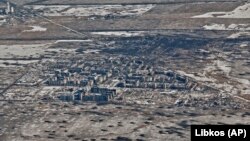"The Russian invasion of Ukraine has triggered the most massive violations of human rights we are living today," UN chief Antonio Guterres told the rights council on the first day of a record six-week session.
Seventy-five years after the signing of the Declaration of Human Rights, UN rights chief Volker Turk meanwhile decried the re-emergences of "the old destructive wars of aggression from a bygone era with worldwide consequences, as we have witnessed again in Europe with the senseless Russian invasion of Ukraine".
Montenegro's President Milo Djukanovic, among nearly 150 ministers and heads of state and government set to address the Human Rights Council this week, cautioned that "Russian aggression is a test for the entire world."
"It is Ukraine today, but tomorrow it might be some other neighboring country. We cannot be neutral."
- 'Dramatically unstable' -
At the opening of the nearby Conference on Disarmament, British minister for Europe Leo Docherty meanwhile issued a statement on behalf of 44 countries slamming Russia's actions.
"Russia's war of aggression against Ukraine is a threat not only to Ukraine, but to international peace and security and to the rules-based international order," he said.
US under secretary of state for arms control and international security Bonnie Jenkins criticized Russia's suspension of participation in New START, the last nuclear arms control pact between Moscow and Washington.
"Russia is once again showing the world that it is not a responsible nuclear power," she said, warning that "we now face a dramatically unstable security environment that pulls us away from collective action here."
In her speech to the conference, German Foreign Minister Annalena Baerbock also denounced Russia for "undermining the arms control architecture we all depend on."
US Secretary of State Antony Blinken is due to address the council remotely on Thursday, while Russian Deputy Foreign Minister Sergei Ryabkov will be there in person that day.
Despite calls from NGOs, observers said it was unlikely there would be a walkout like the one many diplomats took part in when Russian Foreign Minister Sergei Lavrov's video statement played in the council last year.
- War crimes probe -
There is no shortage of other pressing human rights issues for the council to address, with the situations in Iran, Afghanistan, Ethiopia, Syria and Israel on the agenda.
Guterres warned Monday that the Ukraine conflict was just one example of how rights around the world were "under assault from all sides."
"Some governments chip away at it. Others use a wrecking ball," he said, noting that the past century of astounding progress in human rights and development had "gone into reverse".
A long line of resolutions will be voted on during the last few days before the session is due to close on April 4.
One key resolution will be on extending a high-level investigation into crimes committed in Ukraine since Russia's invasion.
The so-called Commission of Inquiry, which has already determined that Russia is committing war crimes on a "massive scale" in Ukraine, is due to present a comprehensive report to the council in late March.
Speaking before the rights council, Baerbock stressed the urgent need for the investigation to continue, and to help determine the fate of the "countless Ukrainian children, that Russia has reportedly abducted", warning that "impunity prevents justice".
Russia Aggression Dominates Top UN Meetings

Days after the United Nations General Assembly in New York voted overwhelmingly to demand Russia withdraw from Ukraine immediately, Moscow's war also dominated the opening of the UN Human Rights Council and Conference for Disarmament sessions in Geneva.
GENEVA —




